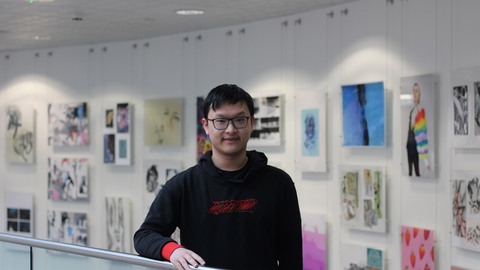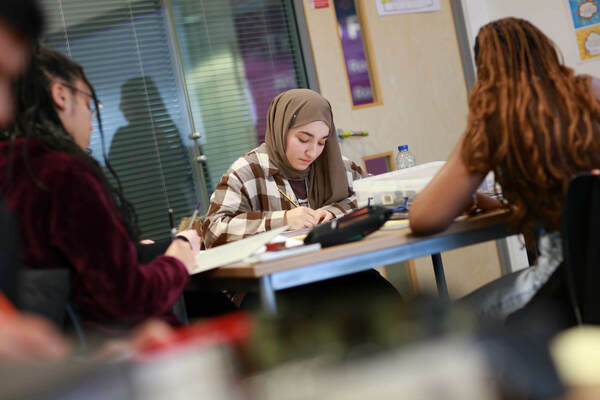Course overview
This is a logical subject where you will learn how to solve complex, multidimensional problems which require imagination and sensitivity to technological, moral, legal and scientific issues. Technology touches almost every aspect of our lives, from the cars we drive, to the films we watch, to the ways businesses and governments communicate with us. Understanding different dimensions of computing is part of the necessary skill set whether you want to be a scientist or develop the latest must-have application.

Entry requirements
Students studying three A Levels and/or AAQs will be expected to have a minimum of two GCSEs at grade 5 and three at grade 4, including a minimum grade 5 in Mathematics and Computer Science.
If you haven’t had the opportunity to study Computer Science but you can demonstrate that you are at a Level 2 standard in programming, you may be considered.
Topics you will study
Component 01: Computer systems
The characteristics of contemporary processors, input, output and storage devices
Types of software and the different methodologies used to develop software
Data exchange between different systems
Data types, data structures and algorithms
Legal, moral, cultural and ethical issues.
Component 02: Algorithms and programming
What is meant by computational thinking (thinking abstractly, thinking ahead, thinking procedurally etc.)
Problem solving and programming – how computers and programs can be used to solve problems
Algorithms and how they can be used to describe and solve problems.
Component 03: Programming project
Students are expected to apply the principles of computational thinking to a practical coding programming project. You will analyse, design, develop, test, evaluate and document a program written in a suitable programming language.
Key features
Computer Science will encourage learners to be inspired, motivated and challenged by following a broad, coherent, practical, satisfying and worthwhile course of study. It will provide insight into, and experience of how computer science works, stimulating your curiosity and encouraging you to engage with computer science in your everyday lives and to make informed choices about further study or career choices.
The key features of this specification encourage:
• emphasis on problem solving using computers
• emphasis on computer programming and algorithms
• emphasis on the mathematical skills used to express computational laws and processes, e.g. Boolean algebra/logic and comparison of the complexity of algorithms
• less emphasis on ICT
The course is split into the following three components:
1. Computer systems (40%)
2. Algorithms and programming (40%)
3. Programming project (20%)
Assessment
Components 1 and 2 are assessed through written examination at the end of the second-year.
Component 3 is assessed through the submission of a completed coded solution to a given problem.
Exam Board: Cambridge OCR
Enrichment and Work Experience
You will have the opportunity to join the Cisco Network Academy where you can gain industry recognised skills in areas such as Networking and Cyber Security. Computer Science students also have the opportunity to gain Microsoft qualifications in MS Office applications including Excel, PowerPoint, Outlook and Word. These practical skill are highly sought after and valued by employers.
The course gives an insight into a variety of careers by engaging with a range of local businesses and guest speakers. Students have the opportunity to complete a one-week work placement or live-brief in the Summer term. You will be proactive in finding a placement that will enable you to use your computing skills and to enrich your experience so that any applications for university or employment will show that you have good practical, as well as good academic levels of achievement.
Why choose B6?
You will be taught by experienced teaching staff who are experts in their field. A variety of delivery styles are used to optimise your potential and you will be supported at every level to achieve the best grades you can. You will have access to industry standard software and high quality hardware resources.
Future career opportunities
Successful students can progress to degree courses including: computer science, information technology, media communications and also business and communication systems. Career options are broad; you may find yourself writing code for the latest hi-tech gadgets, or mission-critical projects such as nuclear submarines, aeroplanes, or working as a hardware engineer designing the latest biometric sensors.
Additional information
The computer science project constitutes 20% of the overall grade and students will need to use a real-life client to work with in order to design and code and effective solution to a problem.
Han Zhang
Studying:
A Level Business, Computer Science and Mathematics
Previous school:
Sharples School
Related Courses
News
The Sixth Form Bolton Weaves New Textiles A Level into Its Course Offer
The Sixth Form Bolton is delighted to announce that it will be launching an A Level in Textiles from September 2026. This exciting course will give students the opportunity to explore the world of fashion, interiors, and surface design while developing their own unique creative voice.
B6 Students Explore World of Artificial Intelligence at the BBC Verify Tour
A group of The Sixth Form Bolton’s second-year Film and Media students visited the University of Lancashire for the BBC’s Live Verify Tour. They worked alongside students from six other colleges to question what they read, watch, and hear, with help from industry experts.
Sixth Form Bolton Student Thrilled to Receive Veterinary Medicine Offer
Second-year students at The Sixth Form Bolton have recently begun hearing back from their university applications, with several receiving offers to study Medicine and Veterinary Science. Anya Patel, a former Sharples School pupil who studies A Level Biology, Chemistry and Psychology alongside the Honours Programme with EPQ and Core Maths, was delighted to receive an offer from the University of Nottingham to study Veterinary Medicine and Surgery.









